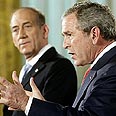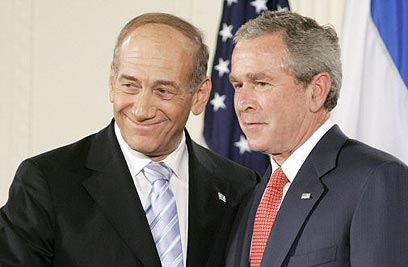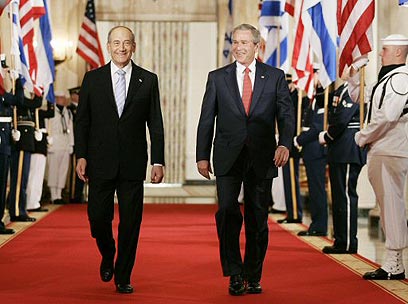
Olmert gets Bush’s blessing
US president believes sincerely in prime minister’s intentions to try to negotiate with a Palestinian partner; if talks fail to materialize, however, Bush backs unilateral Convergence. Olmert ‘very very satisfied’ with outcome of 5.5-hour talks
During their talks, President Bush didn’t beleaguer the prime minister with difficult questions on the convergence – at least not at this stage. Olmert made a commitment to try to find a Palestinian partner for dialogue to give the Road Map peace plan a chance. Their candidate for talks thus far is Palestinian Authority Chairman Mahmoud Abbas.
Apparently both sides benefited at the outcome of the talks – Bush was promised the potential rebirth of the Road map, and Olmert was dealt a vote of confidence in his internationally controversial plan to unilaterally withdraw from parts of the West Bank.
“I am very very satisfied,” the Israeli prime minister repeated to journalists as he rested in the Blair House, the guest quarters of the White House. The president’s stance regarding my ideas for Convergence was expressed clearly and impressively, Olmert said, apparently relieved that Bush seems to be accepting him as Ariel Sharon’s natural successor.
If no negotiations - convergence
At 3:00 p.m. Washington time, Olmert’s limousine arrived at the gates of the Blair House, stopping at the small square facing the White House. Several minutes later, Olmert’s entourage entered the presidential residence for what turned out to be long discussions on numerous issues on the agenda, topped by the Iranian armament crisis and the Israeli-Palestinian conflict. The meeting, which was held in an open and focused atmosphere, participants said, lasted five-and-a-half hours, with President Bush leading the discussions. Afterwards, the president and his guests took the podiums to deliver their statements at a press conference.

Olmert and Bush pleased with outcome of talks (Photo: Reuters)
The headline coming out of the meetings was clear: President Bush believes sincerely in the new Israeli prime minister’s intentions to attempt to achieve dialogue with the Palestinians. If attempts to reach the negotiating table fail, the US and Israel will in the future discuss implementing the unilateral Convergence plan. In parallel, Olmert made another significant pledge: that the Convergence plan would be fully carried out within three to four years. As for the Iranians, Bush evaded committing to preventing the Iranians from attaining nuclear arms by simply promising that if Israel was attacked, American would come to its aid.
Olmert couldn’t have hoped for more express support from Bush to come out of the five-and-a-half hours which he spent in the president’s company. One-and-a-half of those hours were spent as a closed-doors tête-à-tête between Olmert and Bush, although at Bush’s behest the prime minister’s wife Aliza joined the two leaders. According to Olmert, they spoke with great openness on a variety of subjects. Apparently the prime minister has found a full partner for his missions, whether on the Iranian issue, Palestinian matters or a host of other topics.
Letter to Sharon still applies
Bush, Olmert said, still stands behind his letter to then-Prime Minister Ariel Sharon dated April 14, 2004, which includes the matter of Israel appending some West Bank territories to Israel’s borders. The two agreed at this stage that the Road map peace plan was the key to continuing working in cooperation of the Palestinian issue. Olmert told Bush that he would meet with Abbas very soon, committing to a move which he has thus far evaded addressing. To advance matters, Olmert would meet with French President Jacques Chirac and British Prime Minister Tony Blair by mid-June. He would also convene with German Chancellor Angela Merkel on July 9.

Leaders at the White House (Photo: Reuters)
Regarding Abbas, Olmert told the US president that he believed the Palestinian leader's intentions were serious and that he sincerely opposes terrorism. “From the beginning I have said that we accept Abbas as the chosen president of the Palestinian Authority,” Olmert said. With that, though, he added “In the past I’ve expressed concerns and I express them now as well. We hope that (Abbas) will have the power to be able to meet the requirements necessary for negotiations between us and the Palestinians. Our hand is extended to Abbas in peace.”
Another issue that came up during their talks: The freeing of Jonathan Pollard, an American Jew imprisoned in the US on spying charges. Olmert didn’t say whether any progress was made in the matter. The security fence also was raised, and according to Olmert, Bush exhibited a positive attitude with regards to its construction. The two also talked of the chaos laying siege to the Gaza Strip, but Olmert did not give details.
“If there is something to be learned about the president’s priorities,” Olmert said in summing up the conference, “then the fact that I sat for almost six hours with the president shows that the State of Israel shouldn’t feel neglected.”










